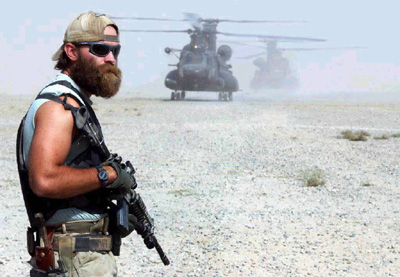by J. R. Nyquist
Top U.S. officials are worried that al Qaeda is preparing a major assault before the November elections. The present level of concern was first voiced by the U.S. Attorney General, then by the Secretary of Homeland Security, and now by the acting Director of Central Intelligence. The warnings qualitatively differ from previous warnings. Two data points serve to explain this qualitative shift. The first data point is the claim that al Qaeda has nuclear weapons that are probably deployed on U.S. soil. The second data point is the fact that steps are being taken to cope with a major disruption of the November elections.
A new book by terrorism expert and former FBI consultant Paul Williams says that al Qaeda acquired 20 nuclear suitcase bombs from the Chechen mafia between 1996 and 2001. This agrees with similar statements made by Yossef Bodansky in his 1999 book, Bin Laden: The Man Who Declared War On America. In saying that al Qaeda poses a nuclear threat, Williams takes his analysis a step farther. He says that al Qaeda has almost assuredly smuggled suitcase bombs into the United States. He also says that these bombs are in the10 kiloton range, capable of inflicting millions of casualties. Williams believes that al Qaeda will use several of these devices in simultaneous attacks against urban targets by the end of 2005.
Is there any reason to credit this dreadful conclusion?
This week the country’s journalists were jolted by reports that security officials are looking into legal mechanisms for postponing the November elections in the event of a terror assault on the homeland. Conspiracy theorists and Bush-haters are already decrying what they call “the obvious power-grab.” But the story is not so simple, since the underlying threat is undeniably real. To be sure, Al Qaeda promised to bring death to America in the wake of 9/11 and death’s tardiness is evident. Many are therefore encouraged to denounce those who offer dire warnings. The July 19 issue of Newsweek offers a startling check to this view. American counter-terror officials have “alarming” intelligence, writes Michael Isikoff, “about a possible al Qaeda strike inside the United States this fall….” Government officials are anticipating an attack that may force the postponement of the November presidential elections.
Now let us think. Would explosions on subways, buses or trains, etc., force a closure of the polls? Spain was hit by train bombings on the eve of its recent elections, and the elections went forward without postponement. To disrupt America’s elections a terrorist would need more than a few conventional bombs. He would have to kill more than a few hundred people to disrupt America’s elections.
According to Isikoff, U.S. intelligence analysts have concluded that al Qaeda wants to “interfere with the [U.S.] elections.” Newsweek’s sources allege that the Justice Department’s Office of Legal Counsel has been asked by the Department of Homeland Security to outline the legal steps required for election postponement
In a July 8 background briefing by the Department of Homeland Security, a senior official said that a major offensive was being planned by bin Laden’s group. “Osama bin Laden and Ayman Zawahiri have issued several public statements last fall,” he explained, “threatening to carry out those attacks. And numerous al Qaeda spokespersons have, in fact, said that these plans are underway and are near completion.”
Al Qaeda’s stated goal is the destruction of the United States. This goal is peculiar in terms of its grandiosity and the frankness with which it has been broadcast. What are we to make of this? A small group cannot realistically hope to achieve such an objective on its own. Yet this is the stated objective. How on earth do they hope to advance their cause when it is so baldly overstated? After all, to propose unrealistic objectives is to court the disappointment of your own followers. If you say that you will soon destroy the United States you had better deliver a devastating attack or brace for a crippling loss of credibility and prestige. Be careful, as well, that your attack is not ineffectual since you will only raise the level of your adversary’s vigilance.
Clearly, it makes no sense that al Qaeda would declare an objective without the means to achieve that objective. Furthermore, Superpowers do not scare easily. A social system predicated on economic optimism isn’t going to surrender its most fundamental assumptions to an Islamic scarecrow hiding in a distant cave. And yet, American officials are worried. Now ask yourselves the next logical question: If the White House suspected that al Qaeda was ready with nuclear weapons on U.S. soil would the president warn the public?
In the first place, the government could not afford to warn the public. The warning itself would trigger an economic disaster and the government would be blamed. The government itself would be called on the carpet. The opposition party would turn the situation to political advantage. Therefore, a warning about nuclear strikes would be political suicide. The ruling power in this country cannot close the border because we depend on foreign trade. The government cannot arrest and deport illegal aliens because we depend on their labor. We cannot deport all Muslim aliens, since political correctness forbids such blatant profiling. The most effective security measures are impossible under the present political system. As it stands the U.S. would have to undergo an internal revolution before Washington could enact the policies most needed to defend against the suitcase nuclear threat. Simply put, the country is not ready to accept such measures. The country is not convinced that such measures are absolutely necessary. Therefore, the government cannot accept the reality of suitcase nuclear bombs sitting on U.S. soil! To admit of such a thing would be tantamount to admitting that our form of government must come to an end.
The basis of our nuclear defense for half a century has been “deterrence.” Unless you can pinpoint your enemy, unless you can locate him on a map, you cannot send a missile against him. You cannot retaliate. In the case of terrorists hiding in remote mountain caves, there may be no deterrence even if you threaten to locate them and nuke their cave. Since they do not care about their own lives, since they are determined to die for their cause, deterrence is ineffective.
Here is the dilemma of the United States in the first decade of the twenty-first century.
© 2004 Jeffrey R. Nyquist
July 14, 2004
Subscribe to:
Post Comments (Atom)













No comments:
Post a Comment